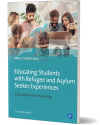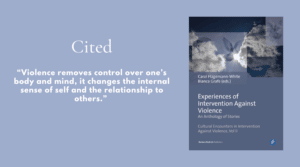Educating Students with Refugee and Asylum Seeker Experiences. A Commitment to Humanity
by Maura Sellars
pp. 1-6
Introduction
The world is currently disrupted by famine, war, violence, and the predatory actions of people against each other. At the time of writing, nearly 66 million people, the largest number in history, are displaced from their homes and urgently in need of assistance from those who are more fortunate. Fifty five percent of these come from just three countries; Syria (5.5 million), Afghanistan (2.5 million) and South Sudan (1.4 million) http://www.unhcr.org/en-au/figures-at-a-glance.html). Almost three million of this number are temporarily placed in Turkey, one and a half million in Pakistan, almost one million in both Lebanon and the Islamic Republic of Iran, and eight hundred thousand in Ethiopia. There are twenty- two and a half million refugees. Over half of this number are under 18 years of age, all of whom have experienced atrocities associated with their refugee status. Refugees are those individuals who must flee their own countries for fear of prosecution as the result of their race, ethnicity, religion, nationality, political opinion, or membership of a specific social group (see http://www.unhcr.org/en-au/figures-at-a-glance.html). Despite their many differences, these individuals have several characteristics in common. These include an overwhelming sense of loss, emotional if not physical trauma and suffering, and the desperate journey to escape the familiar contexts in which they were previously domiciled. The details of these flights vary considerably.
The impact on mental, emotional and physical wellbeing is universal, only varying in degree.
Davidson, Murray, and Schweitzer (2008), found that refugee experiences result in poorer general health; poorer mental health including increased somatisation and dissociation; increased levels of psychological distress including susceptibility to posttraumatic stress disorder (PTSD), anxiety and depression; impairments in cognitive function; low perceptions of educational achievement and career aspirations; a lack of family cohesion and reduced feelings of belonging (in Sellars & Murphy, 2017:2).
These statistics, although confrontational, are hardly surprising. Many people are detained in rudimentary camps with few or no amenities, overcrowding and little chance of improving their circumstances independently. Although relief agencies and other groups often attempt to provide some educational experiences for youth, the lack of resources and transitory nature of these sites and their occupants make consistent, skilled support impossible. Education, if it exists for some youth at all, is invariably interrupted. The focus of this writing does not include the difficulties of educational provision for children and adults in such camps as it may be fraught with other contextual complications.
Several countries act as hosts to these camps and detention centres on a temporary basis, whilst other countries agree to accept an agreed quota of individuals in various categories each year. The latter include ‘first world’ countries; democratic, industrialized, capitalist countries which often have similar economic interests (see http://www.nationsonline.org/oneworld/third_world_countries.htm). Less than half of the displaced population is hosted by these countries. Seventeen percent are in Europe, sixteen percent in The Americas and eleven percent in Asia and the Pacific. It is in these locations that young people who are of appropriate age, are most likely to be compelled to participate in mandatory, mass education.
Mass education universally is characterised by three core elements;
‘.. is institutionally chartered to be universal, standardized and rationalized….institutionalized at a very general collective level…is institutionally chartered to conduct the socialization
of the individual as the central social unit…’ (Boli, Ramirez, & Meyer, 1985: 148-149).
It is these contexts and their students with refugee experiences that are the focus of this work.
Mass Education in a Neoliberal Paradigm
The establishment of school systems and mandatory attendance for children and young people between certain ages is not new, nor is it confined to first world countries. Similar systems have been established in most parts of the world, differing only in the detail of how they are administered (Boli et al., 1985). As society changed in response to advancements in industry, technology, the economy and world affairs, so did the nature and characteristics of education (Tait, 2013). Currently, educational policies in capitalist countries are heavily influenced by the ideologies of various versions of neo liberal economic policies. The neo liberal policies of the 1980s, although differing in the detail, resulted in the break from the Keynesian post war policies which had led to the development of systems such as Swedish social democracy and the welfare provisions in the UK (Steger & Roy, 2010) . The government controlled all the flow of money in and out of the country and high taxes on the wealthy and large corporate companies were used to pay for increased social services and higher wages for workers. Neoliberalist principles championed by Thatcher in the UK and Reagan in the USA focused on a very different paradigm indeed. The common foundations of all neoliberal policies that were implemented during that period were Deregulation, Liberalism and Privatization. During the 1990s Blair in the UK and Clinton in the USA, followed by many of their trading partners, took a more moderate approach and attempted to balance this free trade model (liberalism) with more sensitivity towards the community concerns and social responsibilities that were the results of the policies in the previous decade. Global financial crisis and the establishment of the World Trade Organisation have had some impact on the nature of neoliberalism in the twenty-first century, but the cornerstone of the ideology, free trade, remains (Steger & Roy, 2010), as does the impact of this economic rationalism (Pusey, 1991) on education.
Neoliberalism has redefined education itself in the twenty-first century. In its quest to create new markets where none previously existed and to expand the existing markets, neoliberalism has had a critical impact on educational policies and practices (Connell, 2013a; Ross, 2017) and shows little sign of abating (Wilkins, 2017). Once fully established, these market reforms began to exercise power in every sphere of public life, including schools and what is understood as educational reform. These were implemented mainly as the result of the privatization of many previously owed goods and services, the open trade agreements and the reconfiguration of workforce conditions; which changed not only the ways in which people worked in terms of casual, contract and part time employment, but also the opportunities for lowly paid trade occupations where wages paid by first world countries could not compete with that paid by other countries. The effect of this was increasingly felt by the working classes. Education became aligned increasingly with an industrial model, with the introduction of measurable outcomes and high levels of accountability, much of which is reminiscent of Foucault’s panopticon theory of surveillance and monitoring (Foucault, 1977, 1979). Substantially increased funding for private schools, including religious systemic schools and independent schools, not only took much of the responsibility for educating specific groups of students away from public education systems, but led to increasing privatization of
a mandatory public service as parents at distinct levels of socio economic status increasingly took advantage of a widening range of school choice. Providing society with choice is a cornerstone of neoliberal ideology and, as with other areas of public life, the promotion of school choice has been embraced by individuals who may benefit most from the neoliberal perspective of education (Angus, 2015).
However beneficial the notion of school choice appears to be on the surface, in this economic political model, school choice can serve to disrupt education and minimize the potential of all students to achieve at school. Based on economic principles, not on educational philosophies and accompanying theory, neoliberalist education stresses high levels of individualism, compliance for schools and students to attain outcomes that are benchmarked by neoliberal agenda which promote hegemonic values and market this as an acceptable and appropriate world view (Angus, 2015; Connell, 2013a, 2013b; Ross, 2017; Steger & Roy, 2010). As a result, poor student performance is considered to be the responsibility of individual schools and the product of economy driven political decision which have increasingly permeated educational systems. In response, many parents who have sufficient knowledge of how systems are being managed and have adequate income to choose, become concerned that their children achieve these benchmarks and perform well at school. In order to ensure this outcome, parents who are fiscally secure are increasingly seeking out the best schools in public systems and competing for places in schools in the private sector (Angus, 2015; Connell, 2013b). Market policies ensure, that even in school choice, parents become consumers. Neoliberal educational policies not only eliminate alternative educational views but classify society increasingly on cultural and economic capital (Bourdieu, 1986b, 1990; Bourdieu, Passeron, & Saint Martin, 1994). Students are classified, not on merit but on inherited status. Consequently, students from low socioeconomic backgrounds invariably attend public schools in their own socioeconomic settings. As will be discussed later, choice of school impacts heavily on individuals’ sense of identity (Angus, 2015).
The Purpose of Education in a Neoliberal Paradigm
In congruence with educational policies which are developed according to economic principles, the purpose of education is reconceptualised to reflect these values and processes. The neoliberal ideology has a very distinct understanding of the purpose of schooling. Students are regarded as ‘human capital’ and are educated to have the skills and attitudes of a productive workforce (Gary, 2016). This is in contrast to previous sociological theories of schools as institutions for the reproduction of society, for example Bourdieu’s understanding of purpose of education (Bourdieu, 1986b, 1990; Bourdieu et al., 1994), and the use of institutional regulation, monitoring and conditioning to produce a subservient, passive society as in Foucault’ theory of the Panopticon (Foucault, 1977, 1979). This is not to dismiss these theories as irrelevant to the neoliberal purpose of education, as has been indicated previously, the notion of capital is critical to the neoliberal educational endeavour, and Foucault’s understanding of schools as institutions under regular surveillance and monitoring remain major themes in education dominated by neoliberal economic policies. Currently, there is considerable discussion about Bourdieu’s notions of capital, most specifically the understanding of social capital (see, for example, Putnam, 2002; Putnam & Goss, 2002) and Foucault’s Panopticism (Ball, 2012, 2013; Hope, 2013) and their relevance to the contemporary purpose of education. Both philosophies are discussed later in more detail as they are important in the interpretation of the neoliberal purpose of education and to the lived realities of students with refugee experiences in school systems of countries where this is the dominant political paradigm.
Productivity is foundational to the neoliberal notion of education. People have become increasingly productive through time as the result of the changing of society, increased technological advances, more powerful energy sources and more efficient production processes (Zhao, 2012). However, increased productivity is not a world-wide phenomenon. In the context of first world countries, it has produced better living conditions, better health options and longer working lives, and decreased opportunities for employment in many traditional occupations. Zhao (2012:66), discusses ‘creating jobs, not finding jobs’ as a perspective from which to view the future. This is entirely congruent with the neoliberal agenda of expanding existing markets and creating new ones, however, not entirely realistic given the limited curriculum, prescriptive pedagogies and ever increasing permeation of competition in neoliberal education systems which dominate first world countries (Ross, 2017). A positive view of this paradigm is that education was created for the role that it now plays in preparing individuals by training them in languages and skills of society and then sorting them out into appropriate roles in that context. A more critical view is that the power that is exercised in this sorting process is dominated by those groups who are privileged in society, and that education is used as a tool to reinforce and reproduce the advantages of these groups only, to the exclusion of those who are not members (Connell, 2013a).
An equally important, but less discussed feature of neoliberal education philosophy in both its vision and purpose of education is the way in which it reduces the wholeness and complexity of human life to simply that of workers (Gary, 2016). Human beings are distinguished from other life forms by their capacities for reflection, exploration and investigation and other meaningful forms of leisure that are not just the state of not working, but that are rich non-work experiences that fulfil a deeply held human need and provide opportunities to develop another way of viewing the world. Gary (2016) particularly highlights that education in the neoliberal ideology not only lends itself to individuals increasingly identifying themselves in terms of work, but dehumanizes individuals. He argues that not only does it collapse what it is to be human into producers and consumers, but encourages people to live at a superficial level, that which is not to do with reason and intellectual activity, but is ‘operating below the cognitive- reasoning register’; operating at the level of consumer desire. The most critical feature that Gary (2106) brings to the discussion about the neoliberal educational paradigm is that of quality of schooling. He states, ‘the cerebral emphasis of modern schooling…is poorly equipped to guide us into an alternative way of being’. To engage with ‘an alternative way of being’, he recommends radical pedagogy, including a change of habitus (Bourdieu, 1986a). This assessment of the lack of scholarship in neoliberal educational
frameworks is echoed by Ross (2017) who states ‘when education is forced into the marketplace, the marketplace of ideas shuts down’. It is into this educational paradigm that students with refugee experiences are placed when being accepted into the so called ‘developed’ countries which embrace neoliberal ideology in any of its diverse manifestations.
***
Would you like to continue reading?
Published by Budrich:
 Maura Sellars: Educating Students with Refugee and Asylum Seeker Experiences. A Commitment to Humanity
Maura Sellars: Educating Students with Refugee and Asylum Seeker Experiences. A Commitment to Humanity
© Pexels 2022 / image: Engin Akyurt

